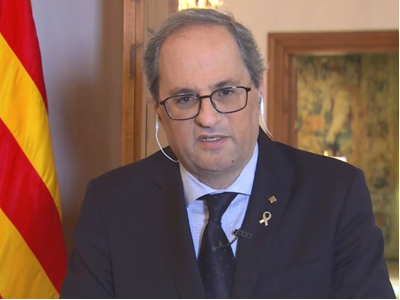- The head of the executive described the Spanish government’s plan to lift the total lockdown as “reckless”, calling for an extension and arguing that a policy on mass testing should be in place before restrictions are scaled back
- Torra said he wants the use of gloves and face masks to be mandatory in public spaces and announced that Catalan pharmacies will soon have 14 million masks to distribute to the public
- The president said the government now has an emergency action plan for care homes and 180,000 tests to start mass testing of residents and launch an isolation operation

In a radio interview today, President Torra warned of the serious consequences that could follow from the Spanish government’s decision to lift the total lockdown on Monday. “A second lockdown would be much worse than a single lockdown,” the president said, stressing the need for an “orderly, planned approach, based on common sense”. Torra also emphasised the need to have a policy on mass testing in place before lifting the lockdown.
The president criticised the Spanish government for not having provided details of its plan to lift the lockdown. He described the proposal as “reckless” because “we can’t ensure that the 900,000 employees who will go back to work in Catalonia starting Tuesday (according to the Chamber of Commerce) will do so under conditions that ensure their safety”. The president said that yesterday evening, based on reports from medical and scientific experts, he submitted a request to the Spanish executive asking for an extension of the total lockdown for all but essential services. Torra said he hoped the Spanish government would heed the request because “the price we’d pay for a second wave would be very high”.
The president also criticised Prime Minister Sánchez for assuring people that the outbreak is under control in Spain. “I think that’s the wrong kind of message to be sending at this point […] because the ICUs are full and health workers are under a lot of strain.”
Torra argued that the measures proposed by the Catalan government – a total lockdown, a universal basic income, and the suspension of tax payments by self-employed workers and companies, all implemented simultaneously – were intended to ensure that the “enormous sacrifice” citizens are making would be as short-lived as possible.
14 million face masks for the public
President Torra said the centralisation of procurement ordered by the Spanish government had made it more difficult to acquire medical supplies. He also stressed the need for a policy on mass testing of the kind being implemented in other countries. The president said mass testing should prioritise front-line health and care workers as well as care home residents.
According to the president, despite the difficulty of acquiring medical supplies, “we have enough stock to cover the needs of our health and care professionals”. Torra announced that between 14 April and 11 May, Catalan pharmacies will take delivery of 14 million face masks for use by the general public. The president also said he wanted the use of gloves and face masks to be mandatory in public spaces.
“We now have an emergency action plan for care homes and 180,000 tests”
Much of the interview focused on the challenging situation in Catalan care homes, where many elderly residents have died of Covid-19. The president stressed that the decision to put care homes under the control of the Catalan Ministry of Health will make it possible to turn the situation around thanks to the strength and resources of the health system. He said the emergency action plan that has been developed will provide a clear picture of the situation in each care facility. “We have 180,000 tests, which will enable us to start mass testing of care home residents and launch an isolation operation.”
The president said it was clear in retrospect that the social care system was less prepared than the health system to deal with the challenges presented by the coronavirus outbreak. He also recognised that the Catalan government had failed to keep the public fully informed of the situation in care homes and of the measures being taken to tackle the problems facing these facilities.